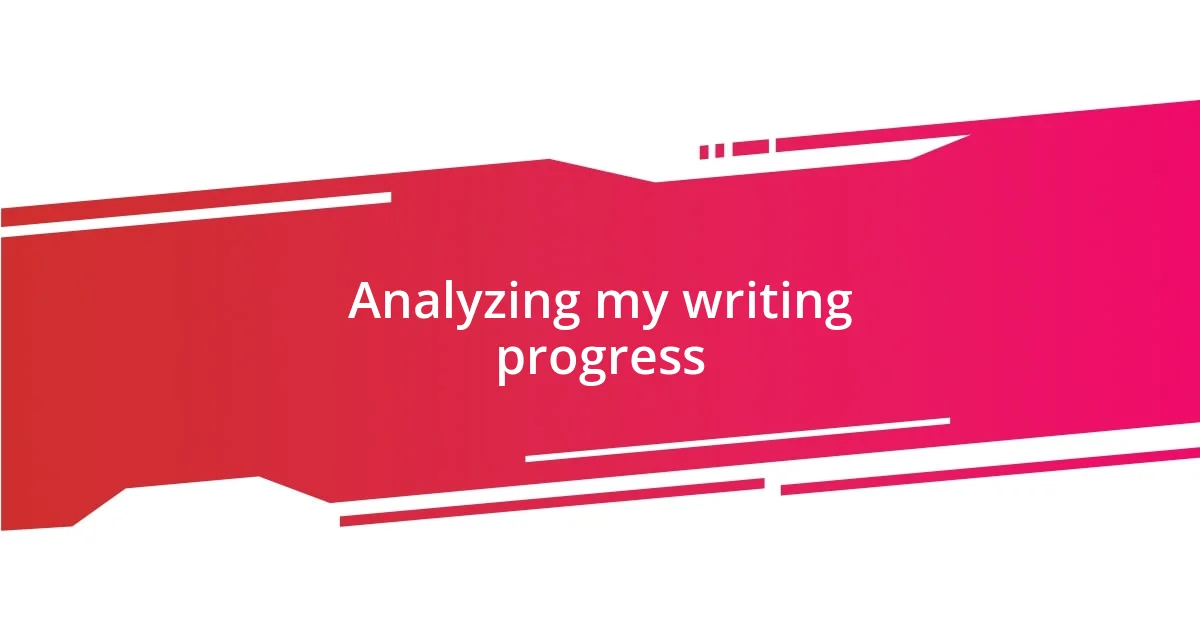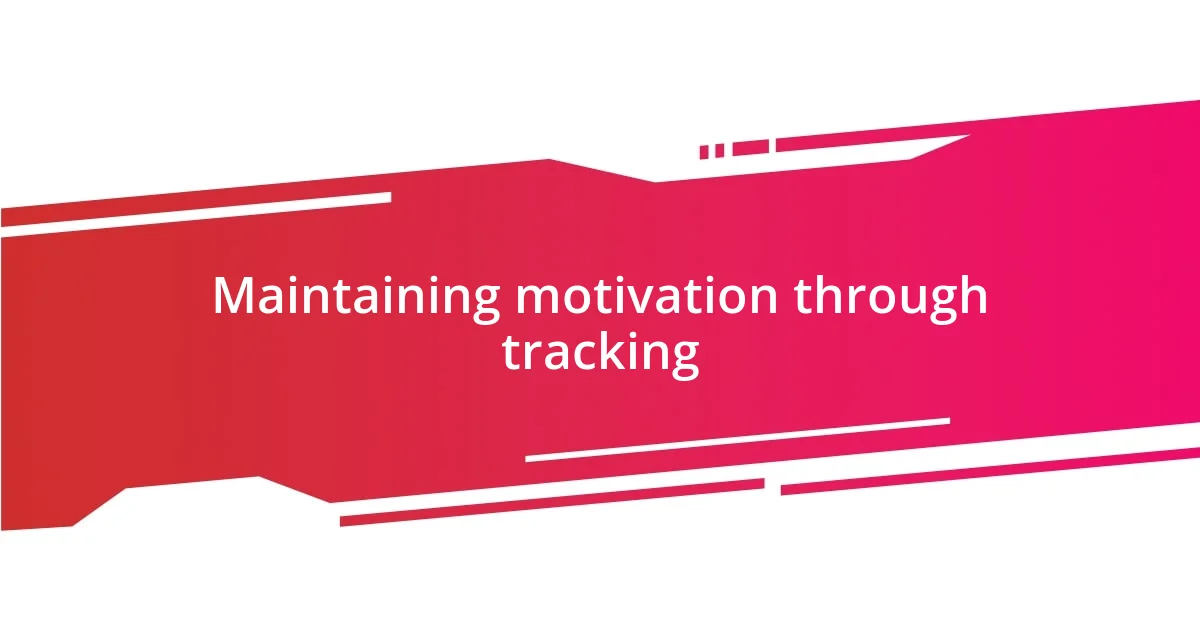Key takeaways:
- Select tracking tools that resonate with your workflow and prioritize simplicity and device syncing to enhance motivation.
- Set realistic, flexible writing goals, focusing on smaller, manageable targets and time-based achievements to prevent burnout.
- Regularly analyze your writing progress to adjust goals based on results, foster motivation, and celebrate incremental victories in your writing journey.

Choosing the right tracking tools
When it comes to choosing the right tracking tools, personal preference plays a huge role. I remember the excitement of trying out various apps, only to find that some just didn’t resonate with my workflow. Have you ever felt that rush of discovery when you finally stumble upon a tool that clicks? It’s like finding the perfect pen that glides effortlessly across the page.
I often find myself gravitating toward simplicity in my tracking tools. For instance, I use a minimalist spreadsheet to keep things straightforward. It’s amazing how clarity can enhance motivation. Have you ever noticed how overwhelming features can distract rather than help? When I streamlined my methods, it made tracking not just easier, but also much more enjoyable.
Additionally, I suggest considering tools that sync across devices. I once lost countless hours of writing because I failed to back up my work on the go. The frustration of losing track of my word count because of a technical hiccup is something I never want to experience again. So ask yourself: does this tool fit into my lifestyle? If the answer is no, it might be time to look elsewhere.

Setting realistic writing goals
Setting realistic writing goals is essential for sustaining motivation and maintaining productivity. I remember setting an ambitious 2,000-word goal for a day, only to find myself staring blankly at the screen by noon. It felt disheartening to not reach that target. Now, I prefer to break my goals into smaller, more achievable chunks. Instead of aiming for an entire article in one day, I focus on a few hundred words. This way, each small victory builds momentum, making the process more enjoyable.
When I first began writing, I often underestimated the time it takes to craft quality content. I’d push myself to write at lightning speed, thinking quantity was key. However, this approach frequently led to burnout and frustration. Now, I make it a point to set goals based on the time I have available. For example, instead of a word count, I might set a goal to write for 30 minutes. This shift not only feels more attainable but also allows me to fine-tune my ideas without the pressure of hitting a specific number.
It’s also vital to consider life’s unpredictability. I’ve had days where unexpected events popped up, derailing my writing plans. On those days, it was liberating to have established flexible goals. I could adjust my expectations without feeling guilty about not reaching a specific word count. I encourage you to embrace this fluidity in your writing journey. Life happens, and so should your goals.
| Approach | Description |
|---|---|
| Aim High | Setting ambitious targets like 2,000 words/day |
| Small Steps | Breaking goals into manageable chunks, e.g., 300 words |
| Time-Based Goals | Focusing on writing for a specific duration instead |
| Flexibility | Adapting goals based on life’s unexpected events |

Daily tracking habits I follow
I’ve found that establishing daily tracking habits transforms my writing routine into a more structured experience. Each morning, I carve out a few minutes to set my word count from the previous day and reflect on my progress. This ritual helps me stay accountable and gives me a clear starting point for what I want to achieve. There’s something incredibly satisfying about seeing those numbers grow, don’t you think? It’s like my own little scoreboard.
To make tracking more effective, I incorporate the following habits into my daily routine:
- Morning Review: Begin the day by reviewing the previous day’s word count.
- Set Daily Intentions: Determine a specific word count goal for the day based on my available time and energy.
- Midday Check-In: Take a moment during lunch to see if I’m on track or need to adjust my goals.
- Evening Summary: At the end of the day, log my final word count and reflect on what worked and what didn’t.
- Weekly Reflection: Every weekend, I assess my overall progress to identify patterns and areas for improvement.
I truly believe that these simple practices create a powerful sense of momentum. Keeping a consistent check-in fosters a little congestion of excitement. After all, who doesn’t love seeing their efforts pay off? It’s like tending to a garden; with regular attention, it flourishes beautifully.

Analyzing my writing progress
Analyzing my writing progress is a game-changer for me. I remember one particular week when I felt stuck on a piece, barely scratching out a few hundred words daily. By the end of that week, I dove into my tracking records and realized I was spending too much time on research without actually writing. This insight prompted me to allocate specific time slots just for writing, which resulted in a noticeable boost in my output. Isn’t it fascinating how numbers can reflect our habits and push us to make changes?
One key aspect of my analysis is identifying patterns in my productivity. For example, I’ve noticed that I write best in the mornings when my mind is fresh. I began tracking my daily output by the hour and found that writing in 25-minute sprints, commonly known as the Pomodoro Technique, dramatically improved my word count. During those focused bursts, I often lose track of time and find myself pleasantly surprised by how much I’ve accomplished. Have you ever had those magical moments where the words just flow effortlessly? It’s almost like a form of meditation for me!
Reflecting on my writing metrics also allows me to celebrate the little victories. I recall a day when I hit a personal record — a whopping 1,500 words. I took a moment to relish that achievement, acknowledging not just the number but the effort behind it. It reminded me that progress isn’t merely about the quantity, but also about the journey. How often do we pause to appreciate our efforts? I think integrating this reflection into my writing practice has made me more resilient and motivated to pursue my goals, no matter how challenging they might feel.

Adjusting goals based on results
Adjusting goals based on results is an essential part of my writing process. For instance, after a week where I consistently surpassed my daily target by a few hundred words, I felt a surge of motivation to increase my goal slightly. It wasn’t just about pushing myself, but also about recognizing that I had the capacity for more. Have you ever found yourself underestimating your potential? I think we all do at times.
On the flip side, there are days when life throws curveballs. I had a particularly busy week last month, and my word count fell significantly short of my regular goal. By assessing my performance, I decided to lower my target for the following week while still striving for quality over quantity. That adjustment taught me that being flexible is crucial. It’s okay not to hit the same numbers every day; it’s about finding that balance that allows us to stay productive without burning out.
I also consider external factors when recalibrating my goals. For example, when I felt a creative block coming on, I reduced my word count to accommodate more brainstorming time. This shift not only freed up some mental space but also paved the way for innovative ideas to flow. Isn’t it refreshing when adjustments lead to breakthroughs? Learning to be compassionate with myself during those times made the entire process much more enjoyable.

Maintaining motivation through tracking
Tracking my word count is more than just numbers on a page; it’s a significant part of my motivation toolkit. I vividly remember days when glancing at my tracker would invigorate my spirit. Just last month, after hitting a small milestone, I found myself smiling at the steady upward trend, feeling inspired to push further. Have you ever felt that rush of accomplishment just by seeing your progress laid out? It’s a little like a shot of espresso for my writing session.
Sometimes, simply knowing I have a target to meet works wonders for my motivation. On those sluggish days, I glance at my daily goals and realize that each word gets me a step closer to something greater. I also discovered that sharing my progress with fellow writers fosters accountability. There have been instances where mentioning my daily word count in a writing group has led to friendly competition, which ignited a spark within me. Is there anything more motivating than a little healthy rivalry?
Interpreting my word count data isn’t just about pushing myself hard; it’s about finding the joy in my progress. There was a week when my average fell around a thousand words because I was distracted by life events. Instead of feeling defeated, I embraced it as a meaningful part of my journey. Reflecting on those moments reshapes my perspective. So, when did you last celebrate your growth instead of fixating on the numbers? It’s a gentle reminder that motivation can blossom from understanding our unique rhythms rather than just striving for constant high performance.















